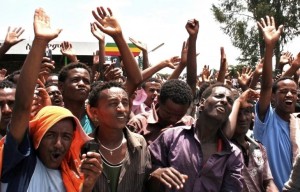By William Davison
ADDIS ABABA, ETHOPIA — This weekend, Ethiopians will participate in their fifth election since rebels removed a military regime in 1991. But the insurgents-turned-rulers from the Ethiopian People’s Revolutionary Democratic Front (EPRDF) look likely to claim another comfortable victory with no viable opposition.

Still, despite what looks to be a landslide win for the ruling coalition, the opposition may capture a handful of seats in their urban strongholds as voters protest poor public services and the ever-rising cost of living.
Where is the formal opposition this election?
The Blue Party, which emerged in 2013 with great enthusiasm after organizing a major demonstration – the first by a political party since 2005 – has been stymied by the government. Its members have been arrested and the government has refused them permits to protest in prominent places. Other parties have also complained about the government interfering with the electoral process.
“It doesn’t seem that this year is election year – the government has totally closed everything,” says Blue Party Chairman Yilkal Getnet. “This election is only ceremonial, it’s not really to win the democratic process and empower the people.”
But the opposition has been taken to task for a lack of policy alternatives, fragmentation, and disorganization. Critics argue that long-serving elitist opposition leaders are only interested in political posturing, and that the EPRDF is the only party capable of governing.
Beyene Petros, the chairman of the Medrek coalition, a prominent opposition group, says that building lasting coalitions in Ethiopia’s diverse electoral landscape is problematic, leaving the opposition too split to take on the EPRDF. Political parties in this country of more than 80 ethnic groups are roughly divided between those who promote a national program and those whose base is a particular ethnic group. The EPRDF is an ethnically based coalition and the federal structure it devised promotes minorities’ rights.
What’s the opposition’s ground game? Can they protest?
The EPRDF has ensured that there is little risk of protest. Despite Ethiopia’s 10 percent growth in GDP in the last decade, poverty is still rife. Many Ethiopians complain about inflation, woeful public services, spreading corruption, and restrictions on civil rights. But having learned its lesson from past elections, particularly in 2005, that prompted widespread protests, the government has clamped down this year.
Previous attempts at mobilization by activists have been snuffed out by well-organized and ruthless security services. Unlike the previous regime, the government uses force sparingly and effectively, says Ermias Abebe, a former political scientist at Addis Ababa University. “One good blow, one fast blow, and everybody gets quiet,” he says.
The government has also taken preemptive action against dissenters, including an ongoing prosecution of a group of pro-democracy bloggers. The seven Zone 9 members, and three others, have been accused of supporting terrorism. But evidence presented so far in court shows only that they were politically engaged.
Why is the EPRDF still popular?
Because they offer a strong development record that Ethiopians can see, particularly in rural areas. There are the high-profile “transformational” infrastructure projects like railways and hydropower dams, often built with Chinese assistance. Then there are the incremental gains made in health, education, and smallholder agriculture, frequently in partnership with Western donors and charities. The government has also bolstered urban support with schemes to provide seed capital and training for unemployed youth to start small businesses.
“It’s not promises that are going to be our strength [at the polls], but our successes” says Destaw Tesfaw, a party spokesman. “What we did for the last 23 years and especially the last five years.”
However, many Ethiopians are concerned that benefits from debt-funded infrastructure investments are not filtering down to the public or stimulating the exports needed to rebalance the economy. Blackouts, water shortages, rock-bottom wages, and high inflation mean that life for the average Ethiopian remains tough.
Still, the dominant economic narrative is attractive enough to move voters. “Comparatively, things are better, but that does not mean people are satisfied,” says Mr. Abebe.
How do Ethiopia’s many international donors feel about the upcoming election?
Ethiopia’s Western partners – which delivered $3.8 billion of aid in 2013 – are in a familiar quandary about an ally that has engineered social and economic progress, while sometimes treating civil rights as an unaffordable luxury.
The African Union is sending election observers but the European Union is not, noting that Ethiopia has not accepted its previous monitoring reports and that it has called into question the “value” of its work.
Half-hearted criticism from long-term allies is unlikely to concern the ERPDF, whose focus is on building what it calls the ‘Democratic Developmental State.’
Source: csmonitor.com


